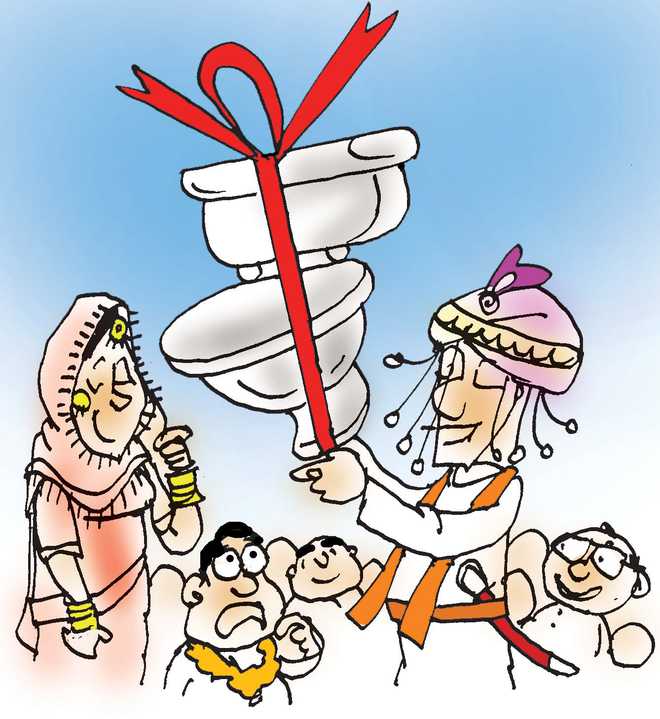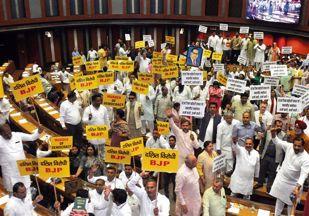
Illustration: Sandeep Joshi
SANDEEP SINHA
INDIAN film-makers keep experimenting, touching hitherto unexplored frontiers. Some time back, there was the film Piku directed by Shoojit Sircar. It was about an elderly grumpy man, a role wonderfully essayed by Amitabh Bachchan, who is troubled by chronic constipation and links all his problems to his bowel movement.
The noted journalist Vinod Mehta in his book Lucknow Boy reminisces of how his father was a man troubled by the waywardness of the excretory system. In fact, it was a topic that would get great consideration in conversations between families and friends and used to be a subject of animated discussion among the elders.
So obviously, toilet has never quite been a taboo in our society. However, in a country like ours, where basic civic amenities elude people, the discussions have not kept pace with action and it is still very common for many homes in the hinterland not to have a proper toilet. It is this subject that the film has broached with the newly-wed leaving her husband on discovering after her marriage that his house does not have a toilet.
The film is no doubt inspired by the many examples from cities like Kanpur and Lucknow, among others, where the brides refused to marry as the groom’s house did not have a toilet. In fact, as a radio jingle says in Punjabi, “Jithe Soch, Utthe Shauchala” (toilets come up with right thinking).
Days back, this newspaper had an agency picture on its front page of a man relieving himself in front of a poster of the film “Toilet: Ek Prem Katha”. It was an apt depiction of how social messages tend to get lost because of our attitude.
I was reminded of an article by the great Hindi writer Shivani in the magazine “Dharmayug” many, many years back. An acquaintance of hers had gone abroad and after landing in India, was on way to his destination when seized by the call of nature, he stopped the vehicle. Later, he remarked that it was one great convenience in this country that eluded him while he was abroad.
In my childhood, I got to attend a marriage in the family that was held in a semi-urban area. One of the members of the bridegroom’s party discreetly enquired, “Aapne jab ghar banwaya tha tab toilet banwaya tha?”
Now, in the hinterland, used to frequenting what is called in popular parlance as “Disha-Maidan”, the question did not come as a surprise. It had nothing to do with what I saw pasted in a loo, “If you keep sitting here all day, you can’t be rich.” Most houses did not have proper toilets, and the concept of public convenience was quite alien before Bindeshwar Pathak came along with his Sulabh Shauchalaya initiative. So, going out was more of a compulsion.
In fact, the “no toilet, no bride” initiative was launched by the government after it came to light that more people had access to mobile phones than toilets. An estimated 75 per cent of the population has a mobile phone subscription while as per the 2011 Census, only 50 per cent of the households have a lavatory and 11 per cent have one connected to the sewerage system.
According to reports, it led to the then Union Minister for Rural Development Jairam Ramesh to remark in a speech in Rajasthan, “You consult Rahu-Ketu before getting married. You should also look whether there is a toilet in your groom’s house before you decide. Don’t get married in a house where there is no toilet.” Ramesh had gone on to remark that India was the world’s largest “open-air” toilet with 60 per cent of the people relieving themselves in the open.
The message in the film, therefore is not quite out of place. It is about the right to lead life with dignity, something which gets violated when women get raped or assaulted under the cover of darkness while going out for a basic need. It is also about improving the lot of our sanitation workers and a step towards preserving public health and checking epidemics.
It needs a cultural medium to disseminate words of social relevance and cinema is a powerful tool. The success of culture as a medium to spread social messages can be seen from the way Sant Balbir Singh Seechewal has worked to preserve the holy Kali Bein river in Punjab.
So, down the toilet? Not quite as far as the film’s message is concerned.



























